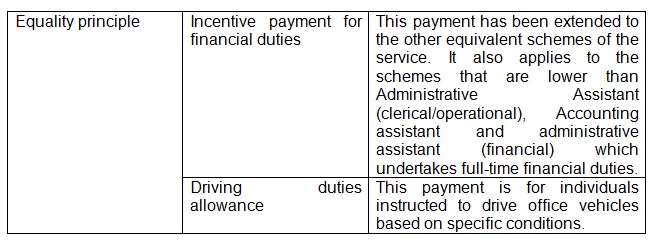Remuneration
Remuneration
Salary
Components of the Remuneration Structure
As stated in the Report of the Special Cabinet Committee of Salaries for the Public Sector 1991, the components involved in the new remuneration structure are:
Basic Salary is the sum of money fixed for public sector personnel based on the concept of a reasonable wage to support basic need comprising food, clothing and shelter.
Fixed Allowances incorporate civil service allowance, housing rental subsidy and entertainment allowance. Payment are made monthly based on the principles and the criteria of payment.
Variable Component consists of various allowances that are not permanent and meant to certain services.
Remuneration Division
Public Service Department of Malaysia
Level 5 & 6,
Block C3, Complex C
Federal Government Administrative Centre, 62510 Wilayah Persekutuan
Putrajaya
- Hits: 26982
Allowances
The principles underlying the provisions of allowances in the Malaysian public sector are outlined in the Cabinet Committee Report 1976 (JKK 1976), and New Remuneration System which are:
- Non-universal
- Non-regular
- Non-permanent
- Equality
The non-universal principle is used to give the provision of allowances to the identified groups or services. Some examples are:

The non-regular principle states the provisions of some allowances that are given in specific situations. For example:
The non-permanent principle determines the provisions of some allowances that are temporarily given. These provisions can be withdrawn or cancelled in the future. For example:

The equality principle guarantees the fairness of the provisions of allowances. They are not limited to certain services, groups or grades, but can be also extended to qualified officers in other services. Some examples of this principle are:
Remuneration Division
Public Service Department of Malaysia
Level 5 & 6,
Block C3, Complex C
Federal Government Administrative Centre, 62510 Wilayah Persekutuan
Putrajaya
- Hits: 24392
Perquisites
- Leave
- Medical
- Housing
- Attire
- Fare
- Other Benefits
Remuneration Division
Public Service Department of Malaysia
Level 5 & 6,
Block C3, Complex C
Federal Government Administrative Centre, 62510 Wilayah Persekutuan
Putrajaya
- Hits: 15062
Joint Departmental Council (MBJ)
Department Council (MBJ) is a two-way forum where the employees are provided a channel to communicate with management in voicing opinions and views as well as contributing constructive ideas for the betterment of the organisation.
Government agencies that have the authority to handle and decide on administration , human resource management and financial matters are required to establish their own MBJ. For this purpose a draft constitution of MBJ must be prepared and agreed by both the management and employees to be submitted to JPA for approval.
The scope and functions of MBJ emphasise on the interests of the employees in an organisation. Its objective is not only to resolve problems faced by them, but also to serve as a platform for discussions between the management and employees. An active MBJ will enhance working spirit among employees to serve with greater dedication and productivity.
Matters that can be discussed in an MBJ's meeting can be anything related to the issues on the implementation of allowances, perquisites, finance, services, service schemes and posts, welfare, administration and etc. Issues related to government policies and personal matters are hindered to be brought in the meeting but nevertheless the management can clarify government policies for better understanding among the employees.
MBJ helps to build a harmonious relationship as well as positive attitude between management and employees. It also creates higher work satisfaction, increase in productivity, improvement in quality of work, reduction in cost, better career advancement of employees, mutual respect between management and employees, problem solving skills, loyalty for the organisation, and builds unity.
- Hits: 12256




